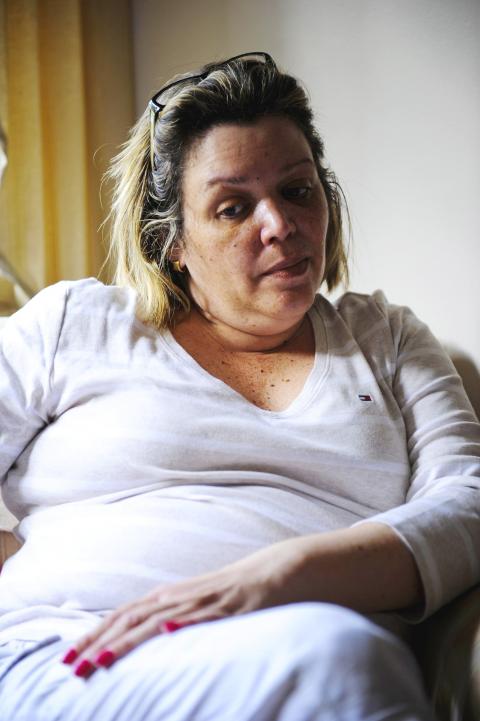Venezuelan authorities on Friday freed a judge who was arrested in 2009 after late Venezuelan president Hugo Chavez objected to one of her rulings. Her case became a cause celebre for the opposition and international human rights groups.
Dozens of supporters met Maria Lourdes Afiuni outside the apartment building where she has been under house arrest with cries of “freedom,” as she walked to the street without handcuffs or police escort for the first time in three-and-a-half years.
Amid a few tears, she thanked the well-wishers for coming out, but declined to comment further since she is still under a gag order not to discuss her case publicly. Instead the judge, her daughter and her lawyers went to a church to pray.

Photo: AFP
Thelma Fernandez, an attorney for the 50-year-old magistrate widely considered Venezuela’s most high-profile political prisoner, said a Caracas judge had released Afiuni from house arrest so she can seek treatment for health problems.
The ruling does not erase the charges of corruption, abuse of authority and aiding an inmate’s escape for which Chavez called for her to be jailed. There was no immediate comment from the government
Afiuni had crossed Chavez by freeing a banker accused of violating currency controls while he awaited trial. The banker fled the country and sought asylum in the US.
Chavez, who died of cancer on March 5, was livid after her order.
“A judge who frees a criminal is much, much, much more serious than the criminal himself,” he said in a televised speech. “This judge should get the maximum penalty, and whoever does this — 30 years in prison ... That judge has to pay for what she has done.”
Critics said the Afiuni case exemplified how Chavez had come to control the judiciary after increasing the size of courts and stocking them with friendly magistrates. Although Venezuela’s government says it holds no political prisoners, Afiuni was considered such by Amnesty International, Human Rights Watch and noted US intellectual Noam Chomsky, an early champion of Chavez for his anti-poverty programs.
After more than a year in a women’s prison, Afiuni was transferred to house arrest at her apartment in the capital in 2011.
In November last year, a court began trying her in absentia. She refused to attend, saying her rights were being violated and she did not recognize the court’s right to judge her.
Jose Amalio Graterol, another of Afiuni’s lawyers, said she will continue to boycott the proceedings, but comply with an order to check in with court officials every 15 days as a condition of her release. She is also barred from leaving the country.
Also last year, writer Francisco Olivares published a book saying Afiuni told him she was raped in prison in 2010, became pregnant and lost the fetus.
Venezuela’s head of prisons rejected that allegation as a “vile lie.”

Swedish campaigner Greta Thunberg was deported from Israel yesterday, the Israeli Ministry of Foreign Affairs said, the day after the Israeli navy prevented her and a group of fellow pro-Palestinian activists from sailing to Gaza. Thunberg, 22, was put on a flight to France, the ministry said, adding that she would travel on to Sweden from there. Three other people who had been aboard the charity vessel also agreed to immediate repatriation. Eight other crew members are contesting their deportation order, Israeli rights group Adalah, which advised them, said in a statement. They are being held at a detention center ahead of a

A Chinese scientist was arrested while arriving in the US at Detroit airport, the second case in days involving the alleged smuggling of biological material, authorities said on Monday. The scientist is accused of shipping biological material months ago to staff at a laboratory at the University of Michigan. The FBI, in a court filing, described it as material related to certain worms and requires a government permit. “The guidelines for importing biological materials into the US for research purposes are stringent, but clear, and actions like this undermine the legitimate work of other visiting scholars,” said John Nowak, who leads field

‘THE RED LINE’: Colombian President Gustavo Petro promised a thorough probe into the attack on the senator, who had announced his presidential bid in March Colombian Senator Miguel Uribe Turbay, a possible candidate in the country’s presidential election next year, was shot and wounded at a campaign rally in Bogota on Saturday, authorities said. His conservative Democratic Center party released a statement calling it “an unacceptable act of violence.” The attack took place in a park in the Fontibon neighborhood when armed assailants shot him from behind, said the right-wing Democratic Center, which was the party of former Colombian president Alvaro Uribe. The men are not related. Images circulating on social media showed Uribe Turbay, 39, covered in blood being held by several people. The Santa Fe Foundation

NUCLEAR WARNING: Elites are carelessly fomenting fear and tensions between nuclear powers, perhaps because they have access to shelters, Tulsi Gabbard said After a trip to Hiroshima, US Director of National Intelligence Tulsi Gabbard on Tuesday warned that “warmongers” were pushing the world to the brink of nuclear war. Gabbard did not specify her concerns. Gabbard posted on social media a video of grisly footage from the world’s first nuclear attack and of her staring reflectively at the Hiroshima Peace Memorial. On Aug. 6, 1945, the US obliterated Hiroshima, killing 140,000 people in the explosion and by the end of the year from the uranium bomb’s effects. Three days later, a US plane dropped a plutonium bomb on Nagasaki, leaving abut 74,000 people dead by the